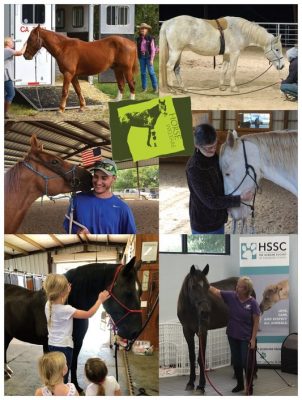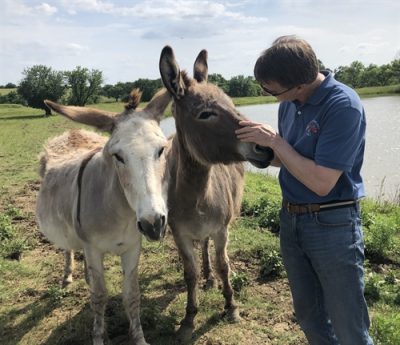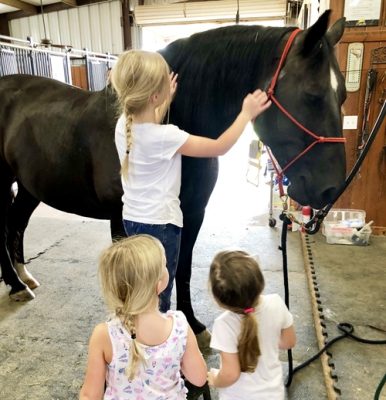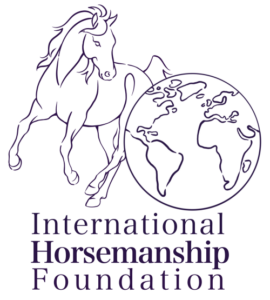Horse Welfare Grants
 The International Horsemanship Foundation provides grants to organizations promoting horse welfare.
The International Horsemanship Foundation provides grants to organizations promoting horse welfare.
The application period for Horse Welfare Grant applications is closed. Be sure you are signed up for our newsletter to be notified of the new application period.
Nothing promotes equine well being more than humans learning to communicate with horses in a way horses understand naturally.
We fund education initiatives for horse rescue centers that improve the welfare of the horse and increase adopt-ability. We also support showmanship and competition when performed using natural horsemanship principles. Rescue center education raises awareness of how natural horsemanship can help rescued horses have a future.
Some examples of the types of grants we provide:
- Natural horsemanship related training equipment and materials
- Educating potential adopters
- Funding to train staff and volunteers in natural horsemanship
- Certification of staff members/volunteers by horse welfare related organizations
- Development of rescue horses by natural horsemanship professionals
- Public outreach through natural horsemanship education, including competition
- Educating the public about issues of over breeding, the real cost of horse keeping and care, best practices in competition and care, etc.
 If you are considering applying and need help to determine if your grant request falls within our mission, please contact us.
If you are considering applying and need help to determine if your grant request falls within our mission, please contact us.
Grants may be given for any combination of the above and will be considered for other related activities. Grants may range in size from $500 to $5,000.
Applications to fund unrelated projects and expenses, such as land, feed, veterinary care, improvements and other non-education related expenses will not be considered by the International Horsemanship Foundation.
Special note to our international friends: The Parelli Foundation is a United States company. We provide grants for non-profit organizations in the United States. We are sorry that currently we are unable to provide grants for organizations outside the United States.
To be considered for a grant, an organization must meet the following minimum qualifications:
- The grantee organization must be a non-profit 501c3 organization.
- The grant requested must fall within our mission.
- The grant application must be properly filled out and received on or before the advertised deadline.
- Applicants must commit to Relationship-Based Horsemanship.
All grant applications are considered for funding without knowledge of the identity of the applicant.
Steps in the Grant Process
- Be sure you meet the qualifications as shown above.
- Start an application using the button at the bottom of this page.
- Answer all questions completely.
- Submit your application by the deadline shown below.
- If your application is approved, you will receive a notification letter from the International Horsemanship Foundation indicating the grant amount and an agreement to sign and return. **Note that the grant amount approved may not be the full grant amount requested.
- Upon receipt of your signed paperwork, the International Horsemanship Foundation will issue a check for the amount of your grant.
- During the term of your grant you must comply with all reporting requirements and other terms of your grant. Reporting is required twice per year. For more information on reporting requirements, see our reporting form at the tab on the left.
- Any remaining balance left over after the purpose of your grant is completed, must be returned to the International Horsemanship Foundation.
Return to this page for a button link to the application during the application period shown above.
 Resources Overview
Resources Overview
Resources for those seeking help in other areas beyond Relationship-Based Horsemanship and related to horse welfare such as:
- Competition
- Standards of care
- Rescue and Rehoming
- Inhumane Treatment of PMU mares/foals/nurse mare foals
- Lack of Knowledge and Skills
- Humane euthanasia
- Wild Horse/Burro management
Learning About Horse Welfare in training/showing, racing, and other forms of competition.
| Background Information:
Issues impacting equine welfare in competition
Despite improved regulations in these areas and improving judging standards, penalties for infractions are often not serious enough and are applied inconsistently. |
Resources/Organizations devoted to these issues:
Center for Animal Welfare |
|---|
Standards for Facilities and Care
|
|
Current Resources/Organizations devoted to this issue: Equine Sanctuary and Rescue Facility Guidelines Local agricultural associations/farm bureaus have courses on farm and equine management. |
|---|
Resources for Rescue, Re-homing, and Long Term Care
|
Background Information: The need for space at rescue centers may be 10 times the current availability (roughly spots for 6000 horses annually). Data compiled by the Equine Welfare Alliance indicate that the cost of feed is the most important factor leading to unwanted horses. The 2007 UHC Survey identified several factors leading to the number of unwanted horses: downturn in economy including change in owner employment, loss of owner interest, closing of processing facilities, indiscriminate breeding, unmanageable horses, old age/injured horses. |
Current Resources/Organizations devoted to this issue: |
|---|
The Pregnant Mare Urine (PMU) and producing Premarin
|
Background Information: Pregnant mare urine (PMU) is processed to make the hormone replacement Premarin. Concerns about the living conditions for Premarin mares and foals as well as the high probability of these horses being sent to slaughter are real. The Thoroughbred industry produces thousands of “nurse mare foals” each year due to the practice of using nurse mares. This practice stems from the inability to use artificial insemination in the breeding of Thoroughbreds. Read more about this issue from Last Chance Corral.  |
Current Resources/Organizations devoted to this issue: Equine Advocates: Pregnant Mares’ Urine (PMU) Industry North American Equine Ranching Information Council: Consensus Report The American Association of Equine Practitioners proposed an alternative to impregnate mares to produce a nurse mare International Veterinary Information Service: How to Induce Lactation in Non-Pregnant Mares |
|---|
Unintentional Abuse: Lack of Knowledge and Skills
|
Background Information: Unintentional abuse by novice owners, trainers, and riders results from lack of the knowledge and skills needed to own, care for and ride horses. Many resources exist to provide education and improve the lives of horses and the people who love them. Horses developed through Relationship-Based Horsemanship are confident in a variety of situations  In the water On the trail |
Current Resources/Organizations devoted to this issue:
State Horse Councils or Boards vary in their missions and programs. See what your state Horse Council or Board has to offer.  Through the gates Working cows |
|---|
Humane Euthanasia and Disposal
|
Background Information: It has been suggested that the cost of euthanasia and disposal of unmanageable, old, and injured horses contributes to the number of horses abandoned, sent to auctions or rescues, or transported for slaughter. |
Current Resources/Organizations devoted to this issue: |
|---|
Wild Horse and Burro Management
|
Background Information: Here is an article that presents an overview of the wild horse situation with suggestions for management improvements. This is a very controversial topic. |
Current Resources/Organizations devoted to this issue: |
|---|
The International Horsemanship Foundation is a Partner in the Right Horse Initiative

The Right Horse Initiative of The American Society for the Prevention of Cruelty to Animals (ASPCA®) hosts a collective of industry professionals, equine welfare organizations, and advocates working together to re-frame the conversation around equine adoption and improve the lives of horses in transition through a dialog of kindness and respect.
What This Means for You and For The International Horsemanship Foundation
- Support for The Right Horse’s goals of massively increasing the number of successful horse adoptions.
- Broad based education, training, and public awareness
- Alignment with the Horse Welfare goals of the Parelli Foundation
- Shattering the stigma surrounding horses in transition
- Providing access to fostering or adopting equines from sources aligned with The Right Horse initiative. Visit MyRightHorse.org
“Together we will continue to improve the lives of countless horses through innovative programs, training, and increased public awareness.” Dr. Emily Weiss, Vice President of ASPCA® Equine Welfare.
Organizations receiving horse welfare grants are required to report the progress of their grant program twice a year. Use this form for making reports.

